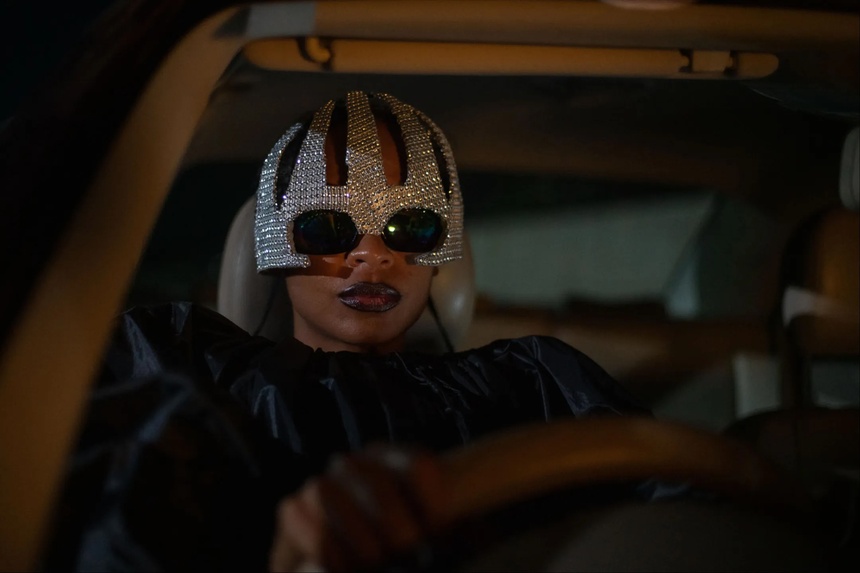Montreal Nouveau 2024 Review: ON BECOMING A GUINEA FOWL

It's hard to imagine what any of us would do, if we were driving along a quite road and came across a dead body, let alone the body of a member of our family. For Shula (Susan Chardy), on her way home from a fancy dress party, in her fabulous sparkling mask that highlight her guinea fowl costume, finding the very much dead body of her Uncle Fred, seems to spark little emotion, but the barest sense of familial duty. She makes the necessary phone call to her father, setting off a chain of events that will see her embody the creature whose visage she wears.
After several shorts, Zambian-Welsh filmmaker Rungano Nyoni became more widely known in 2017, with her resounding feature debut I am Not a Witch. The story of a child (also names Chula) convicted of witchcraft, it explored old prejudices and gender stereotypes that have serious consequences for the accused. Developing on some of those themes and exploring new ones, On Becoming a Guinea Fowl exposes generational trauma and how the labour of women in a patriarchal world reinforces sexism and abuse in an endless cycle that noone seems able, or willing, to stop.
Once the body is confirmed as the Uncle, so the mourning ritual begins. Shula's mother returns from abroad, and a huge number of aunties, cousins, and other assorted relatives descend on Shula's house, apparently as the centre of this ritual. There is much wailing and near-rending of clothes. And apparently blame cast in the direction of Uncle Fred's widow, without any strong reason for it. At first, Shula tries to avoid it, still seeming indifferent to the matter. But her aunties remind he of her familial duties, both through coersion and prostration. Shula agrees and soon finds herself at the beck and call of everyone. She goes through the motions, while her cousin Nsansa (Elizabeth Chisela, who pulls off the perfect drunk-acting) seems to be all mirth and alcohol.
When asked to collect their young cousin Bupe (Esther Singini) from her university dormitory, which is curiously flooded, and it seems she might have tried to kill herself. Shula realizes that Bupe, like herself, was a victim of the uncle's abuse - and it seems this abuse hit nearly everyone of their generation, including the uncle's very young widow, who is treated with such worsening disdain (to put it mildly) by Shula's mother and aunts, that she and her family are forced to sleep in the empty pool.
A generational divide is clear: while Shula has worked hard, and it seems succeeded, in building a successful life, she is dragged back into a conformity of culture that only perpetuates violence. The camera follows Shula as she is constantly on the move, navigating the arguing aunties, occasionally serving the mostly absent men - whom apparently do very little actually mourning, yet expect to be catered to. With each scene, with each act of ritual maintenance that Shula must perform, she reveals another layer of what had been done to her, her increasing inability to hide her anger and frustration, as she is asked for more and more (her father wants money, her aunts want obediance), and she has fewer inclination to give anything to those who perpetuate this cycle.
Nyoni does a subtle yet powerful juxtaposition in ths structure: we are on the ground, as it were, with the aunties in their mourning, as well as their forceful opinions on who is to blame for Fred's untimely death. We slowly understand that he was an abusive man that no one is willing to hold to account. Occasionally, Shula seems to walk a border into a semi-dream realm, where this old trauma is manifest as water or earth or animal that keeps surfacing. And memories of a childhood television program on the titutal animal, one indigenous to this part of Africa, and that serves to warn other species of approaching predators.
The surrealism seems to be the borders around which Shula has had to conduct herself for some time, with the secrets that have been her burden. Nyoni simultanously builds this story brick by proverbial brick, while having her characters prepare to smash that wall of silence and refusal of truth. Shula must watch men, who have done little or nothing about what continues to happen, hold court over women who nonetheless support this continues patriarchal control and abuse. And she knows she must return to that creature whose visage she wore in the beginning - only this time, it's not a costume, but a rallying cry.
On Become a Guinea Fowl confronts head-on how 'tradition' is often a cloak used to disguise abuse, allowing perpetrators to commit crimes and witnesses to ignore those in peril, and how a younger generation can, and must, break this cycle. Nyoni deflt combined a strange folkloric surrealism with a modern outlook, protagonists who must defy their elders to find their earned and necessary agency and autonomy.
On Becoming a Guinea Fowl
Director(s)
- Rungano Nyoni
Writer(s)
- Rungano Nyoni
Cast
- Susan Chardy
- Roy Chisha
- Blessings Bhamjee







